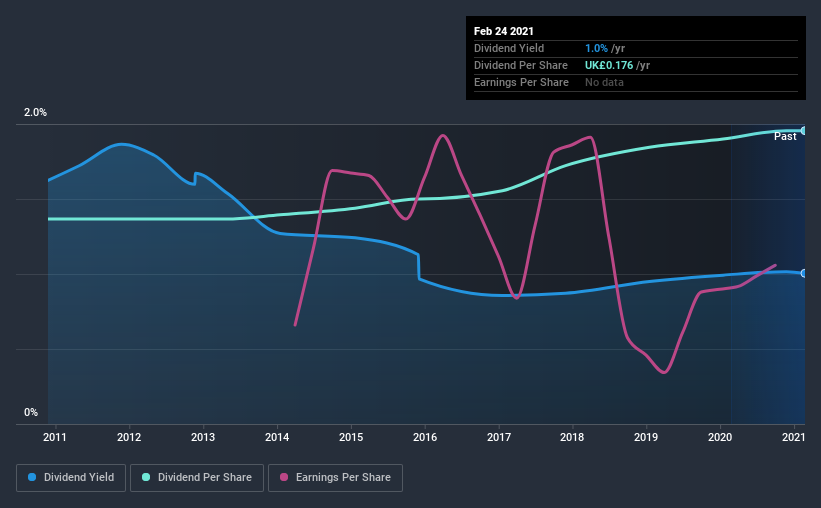Today we'll take a closer look at Cardiff Property Plc (LON:CDFF) from a dividend investor's perspective. Owning a strong business and reinvesting the dividends is widely seen as an attractive way of growing your wealth. Unfortunately, it's common for investors to be enticed in by the seemingly attractive yield, and lose money when the company has to cut its dividend payments.
While Cardiff Property's 1.0% dividend yield is not the highest, we think its lengthy payment history is quite interesting. During the year, the company also conducted a buyback equivalent to around 3.7% of its market capitalisation. Some simple analysis can reduce the risk of holding Cardiff Property for its dividend, and we'll focus on the most important aspects below.
Explore this interactive chart for our latest analysis on Cardiff Property!

Payout ratios
Companies (usually) pay dividends out of their earnings. If a company is paying more than it earns, the dividend might have to be cut. So we need to form a view on if a company's dividend is sustainable, relative to its net profit after tax. Cardiff Property paid out 12% of its profit as dividends, over the trailing twelve month period. Given the low payout ratio, it is hard to envision the dividend coming under threat, barring a catastrophe.
Another important check we do is to see if the free cash flow generated is sufficient to pay the dividend. The company paid out 76% of its free cash flow as dividends last year, which is adequate, but reduces the wriggle room in the event of a downturn. It's encouraging to see that the dividend is covered by both profit and cash flow. This generally suggests the dividend is sustainable, as long as earnings don't drop precipitously.
While the above analysis focuses on dividends relative to a company's earnings, we do note Cardiff Property's strong net cash position, which will let it pay larger dividends for a time, should it choose.
We update our data on Cardiff Property every 24 hours, so you can always get our latest analysis of its financial health, here.
Dividend Volatility
From the perspective of an income investor who wants to earn dividends for many years, there is not much point buying a stock if its dividend is regularly cut or is not reliable. Cardiff Property has been paying dividends for a long time, but for the purpose of this analysis, we only examine the past 10 years of payments. During this period the dividend has been stable, which could imply the business could have relatively consistent earnings power. During the past 10-year period, the first annual payment was UK£0.1 in 2011, compared to UK£0.2 last year. Dividends per share have grown at approximately 3.6% per year over this time.
Slow and steady dividend growth might not sound that exciting, but dividends have been stable for ten years, which we think is seriously impressive.
Dividend Growth Potential
Dividend payments have been consistent over the past few years, but we should always check if earnings per share (EPS) are growing, as this will help maintain the purchasing power of the dividend. It's not great to see that Cardiff Property's have fallen at approximately 5.0% over the past five years. Declining earnings per share over a number of years is not a great sign for the dividend investor. Without some improvement, this does not bode well for the long term value of a company's dividend.
Conclusion
To summarise, shareholders should always check that Cardiff Property's dividends are affordable, that its dividend payments are relatively stable, and that it has decent prospects for growing its earnings and dividend. Cardiff Property's dividend payout ratios are within normal bounds, although we note its cash flow is not as strong as the income statement would suggest. It's not great to see earnings per share shrinking. The dividends have been relatively consistent, but we wonder for how much longer this will be true. In sum, we find it hard to get excited about Cardiff Property from a dividend perspective. It's not that we think it's a bad business; just that there are other companies that perform better on these criteria.
Market movements attest to how highly valued a consistent dividend policy is compared to one which is more unpredictable. Meanwhile, despite the importance of dividend payments, they are not the only factors our readers should know when assessing a company. Case in point: We've spotted 3 warning signs for Cardiff Property (of which 1 makes us a bit uncomfortable!) you should know about.
If you are a dividend investor, you might also want to look at our curated list of dividend stocks yielding above 3%.
If you decide to trade Cardiff Property, use the lowest-cost* platform that is rated #1 Overall by Barron’s, Interactive Brokers. Trade stocks, options, futures, forex, bonds and funds on 135 markets, all from a single integrated account. Promoted
New: AI Stock Screener & Alerts
Our new AI Stock Screener scans the market every day to uncover opportunities.
• Dividend Powerhouses (3%+ Yield)
• Undervalued Small Caps with Insider Buying
• High growth Tech and AI Companies
Or build your own from over 50 metrics.
This article by Simply Wall St is general in nature. It does not constitute a recommendation to buy or sell any stock, and does not take account of your objectives, or your financial situation. We aim to bring you long-term focused analysis driven by fundamental data. Note that our analysis may not factor in the latest price-sensitive company announcements or qualitative material. Simply Wall St has no position in any stocks mentioned.
*Interactive Brokers Rated Lowest Cost Broker by StockBrokers.com Annual Online Review 2020
Have feedback on this article? Concerned about the content? Get in touch with us directly. Alternatively, email editorial-team (at) simplywallst.com.
About LSE:CDFF
Cardiff Property
The Group, including Campmoss, specialises in property investment and development in the Thames Valley.
Flawless balance sheet with slight risk.
Market Insights
Community Narratives



